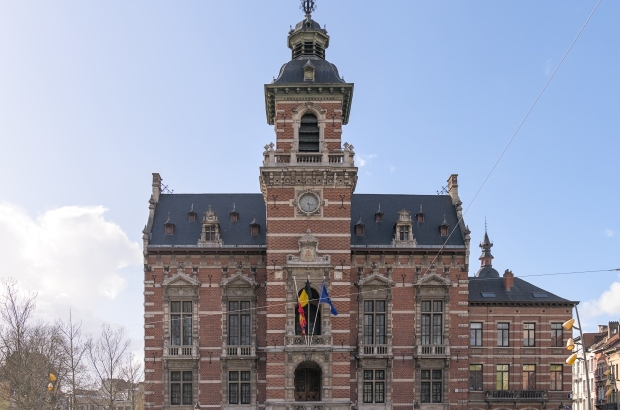- Daily & Weekly newsletters
- Buy & download The Bulletin
- Comment on our articles
Anderlecht implements new rules on municipal staff wearing religious symbols
Anderlecht town council has voted in favour of a motion to allow municipal staff to wear clothing or symbols that indicate their religion, with one key exception.
For staff with "functions associated with authority, who are in contact with the public", it remains the rule that no religious displays are permitted.
The municipal council has also asked the regional government to allow and frame those religious or philosophical symbols for all municipal and regional administrations through an ordinance - something that will be difficult to accomplish given the divisiveness of the issue.
The Anderlecht council also decided to set up a working group within the administration to oversee the implementation of the new rule within the municipal administration, “pending the entry into force of that [regional] legislation”.
That includes declining what counts as an "authority function". For example, a sanctioning officer is an instance of an authority function that has contact with the public.
The aim of the change in Anderlecht is “to encourage the authorisation of convictional signs for staff in contact with the public, as long as this does not involve a notion of authority”. Te partial abolition of the current ban requires an amendment to the labour regulations.
Political parties PS, Vooruit, Les Engagés and PTB/PVDA voted in favour, and the parties of Défi and N-VA voted against.
Ecolo/Groen eventually abstained because it said the text did not go far enough. The MR party, which was against the motion and had asked for postponement, remained absent because it argued that the conditions for a “serene” debate were not met.
The issue has been a thorny one in Brussels, with the debate mainly taking place around the wearing of headscarves.
Some councillors who wanted a ban on city staff wearing headscarves received death threats, and proponents of removing the ban called for supporters to swarm the council meeting, which was why MR argued that a serene debate was not possible.
The various competent authorities involved in the Belgian capital also complicate the matter. The union for public transit company Stib, for example, is against forbidding the wearing of a headscarf.
Currently, wearing indications of religious affiliation is banned in all Brussels municipal buildings, sometimes explicitly, sometimes implicitly, based on existing legislation regarding neutrality.
But debates over headscarves in recent years have brought that legislation under scrutiny and prompted the formation of various working groups, so far without many substantial changes as a result.
Anderlecht’s newest motion has already prompted unhappiness. Élisabeth Degryse (Les Engagés) told La Première that the fact that Ecolo did not side with the rest of the majority on the town council was "problematic".
“At a time when the public is having trouble with all the petty political games, losing interest in what's going on – for Ecolo to do this, to deliberately add fuel to the fire, is truly unacceptable,” Degryse said.
“I think that in a democratic debate that we wanted within a majority, we made room for all positions, we accepted a text of a motion which, I repeat, is not a text of a law, and we are committed to dealing with the issue.”
François Tulkens, professor of constitutional law at UCLouvain and Saint-Louis Brussels, pointed out that there was little clarity to be found in the Belgian constitution, whose language is broad and contains no mention of secularism.
“The term does not exist in the Belgian constitution, unlike the French constitution,” said Tulkens.
“As for the term 'neutrality' in the Belgian civil service, it’s not in the constitution either. The principle of equality is: equal access to the civil service, equality of users before the civil service.”
Another constitutionalist, Marc Uyttendaele, pointed to the very broad word "conviction" in the constitution.
“If we allow religious symbols, we must allow symbols of any other affiliation,” Uyttendaele said. “In fact, anything goes. In other words, religious convictions, political convictions, philosophical convictions.”
Even associations are divided, with Hervé Parmentier of Centre d'Action Laïque, the umbrella organisation of numerous secularist associations in French-speaking Belgium, saying: “We believe that civil servants embody the state in some way, and so their appearance must show that they are completely impartial.”
Meanwhile, Pierre-Arnaud Perrouty, director of the Human Rights League, said: "If you look at the UK, there are plenty of civil servants who wear either a Sikh turban or a headscarf, and that doesn't bother many people. Fundamentally, what's important is that these people obviously do their job in a high-quality way.”
The subject is a delicate one, and the European Union has not yet reached a decision either. The Court of Justice of the European Union recently recognised the right of an administration to impose neutrality on its employees, while at the same time pointing out that authorising "convictional" signs or clothing was just as legal.
In Flanders, ideological signs are allowed in the largest cities and, in Antwerp, municipal staff not in the public view are allowed to wear them. In Ghent and Mechelen, however, public-facing staff are permitted to wear indications of religion.
Photo: Benoit Brummer/Wikimedia. Licensed under Creative Commons

















